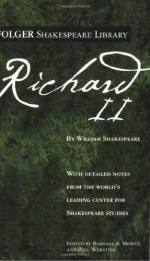|
This section contains 6,495 words (approx. 22 pages at 300 words per page) |

|
SOURCE: Mayer, Jean-Christophe. “Shakespeare's Religious Background Revisited: Richard II in a New Context.” In Shakespeare and the Culture of Christianity in Early Modern England, edited by Dennis Taylor and David Beauregard, pp. 103-20. New York: Fordham University Press, 2003.
In the following essay, Mayer demonstrates how Shakespeare's Richard II exacerbated the volatile and ideologically unstable climate of the late Elizabethan period. The critic details how different political and religious factions manipulated the play's themes of loyalty and betrayal to serve as propaganda for their own causes, culminating in an alleged staging of the play the night before the ill-fated Essex Rebellion.
When Shakespeare completed Richard II in 1595, he was writing in a period that historians have ceased to regard as congenial.1 Those “nasty nineties,” as Patrick Collinson observed, were certainly not a period of stabilization, routinization, or secularization: this was not “a decade of sweetness and light, of incipient...
|
This section contains 6,495 words (approx. 22 pages at 300 words per page) |

|


